THE
TROJAN WAR
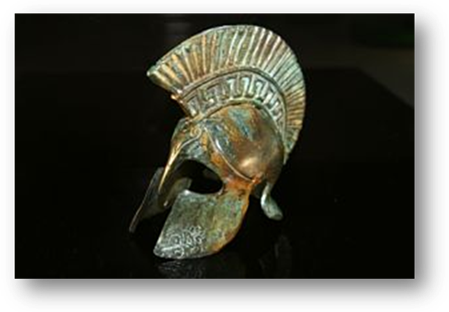
Unit Overview
Thousands
and thousands of years ago, near the eastern end of the Mediterranean Sea,
there was a great city that was very rich and powerful. It was second to none on earth. This city was Troy, and there was no city
more famous. This city became famous
because of the Trojan War and the great epic poem by Homer, The Iliad. It’s hard to believe that the cause of such a
major war began with a fight between a few goddesses.
The Golden Apple
The
evil goddess of discord, Eris, was not popular in Olympus. When the gods held banquets, she was left out
on purpose. She resented this and was
determined to make trouble. One day,
there was a celebration for the marriage of King Peleus and the sea nymph
Thetis. All of the gods and goddesses
were invited except for Eris. This
greatly upset her and she decided to create her own fun.

Into
the banqueting hall Eris threw a golden apple.
On this apple was inscribed the words “for the fairest.” Naturally, all of the goddesses wanted this
apple. In the end, it was narrowed down
to three goddesses – Aphrodite, Hera, and Athena. They first went to Zeus and asked him to determine
who would receive the apple.
Intelligently, Zeus declined to make this decision. He knew that whatever he decided would upset
the other two goddesses. Instead, he
told the three to go to Mount Ida, near Troy.
Here, the young prince Paris would make the decision. Zeus told the three that Paris was an
excellent judge of beauty.
Paris, although a royal prince, was doing
shepherd’s work. This was because his father, Priam, the King of Troy, had been
warned that his son would one day be the reason for the downfall of his family. So, Priam sent Paris away. At this time, Paris was living in the country
with a nymph named Oenone.
When
Athena, Aphrodite, and Hera appeared to Paris, he was amazed. The three goddesses asked him not to consider
who was the most beautiful, but to consider which bribe was the most appealing. The three were prepared to bribe Paris in
order to receive the golden apple. All
three offered things that would be attractive to any man. Hera promised to make Paris the lord of
Europe and Asia. Athena said that Paris
would lead the Trojans to victory in a war against Greece. Aphrodite said that she would make the
fairest woman in the world his. Paris
chose Aphrodite’s offer. He would receive
the fairest woman in the world, and Aphrodite would receive the golden
apple. This was the Judgment of Paris
and the real reason that the Trojan War was fought.
Helen
The
fairest woman in the world was named Helen.
She was the daughter of Zeus and Leta and the sister of Castor and
Pollux. Everyone knew how beautiful she
was. All of the eligible young men in
Greece were interested in marrying her.
When her suitors assembled in her home to ask for her hand in marriage,
her mother’s husband, King Tyndareus, was afraid to select one among them. Tyndareus was afraid that if he selected one
young man, the others would unite against him.
Therefore, he exacted a solemn oath from all of the suitors.
Tyndareus
made the suitors swear that if any wrong was done to the man selected to be
Helen’s husband, they would all support him and fight for him. Eager to learn who was the lucky man who
would be married to the most beautiful woman in the world, the young men agreed. It was to their advantage to make this
oath. They were hoping to be named her
husband, and they would also gratefully accept the help if needed, especially
if someone attempted to abduct Helen.
Tyndareus selected Menelaus, the brother of Agamemnon, and made him the
King of Sparta as well.
All
of these events had taken place when Aphrodite promised the fairest woman in
the world to Paris. Aphrodite knew who
the most beautiful woman in the world was, and she knew where she could be
found. Paris didn’t think twice about
leaving Oenone. He left for Sparta,
where Menelaus and Helen received him as their guest. Remember that the ties between guest and host
were strong and that hospitality was important.
Guest and host were not to bring harm against one another. It was Paris who broke this sacred bond. Menelaus trusted him completely and left
Paris in his home when he went to Crete.
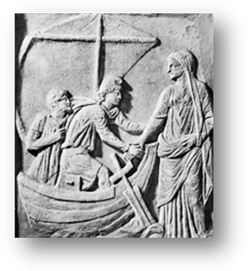
The Call to War
When
Menelaus returned home from Crete, he discovered that Helen was gone. He called upon all of Greece to help
him. Many of the young men who had
previously sworn to serve and protect Menelaus reported. The idea of fighting in a war, crossing the
seas, and leaving Troy in ashes appealed to them. There were two who did not report to
fight. Odysseus, the King of Ithaca, and
Achilles, the son of Peleus and the sea nymph Thetis, did not report.
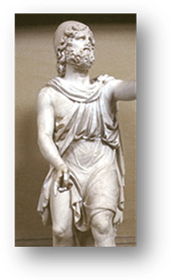
Odysseus
Odysseus
was considered to be one of the wisest and shrewdest men in Greece. He did not want to leave his house and family
to embark on a war for what he considered to be a faithless woman. He pretended that he had gone mad in order to
avoid going to war. When a messenger
from the Greek Army arrived, King Odysseus was plowing a field and sowing it
with salt instead of seeds. The messenger
was smart, however, and outsmarted Odysseus.
He grabbed Odysseus’ son and put him directly in the way of the
plow. Instantly, Odysseus turned the
plow, sparing his son and proving that he had all of his wits about him. Reluctantly, he had to join the army.
Achilles
was held back by his mother. The sea
nymph knew that if he went to Troy it was fated that he die there. She sent him to the court of Lycomedes, the
king who had killed Theseus. He made
Achilles wear women’s clothes and hide among the maidens. Odysseus was dispatched by the army to find
him. Disguised as a peddler, or person
who sells things on the street or door to door, Odysseus went to where the
maidens were socializing. In his pack,
he carried jewelry and trinkets that would appeal to the women. He also had some fine weapons and
knives. While the girls admired the
jewelry, Achilles was admiring the weapons.
Odysseus then knew that Achilles was hiding. He had no trouble making Achilles disregard
what his mother had said. Achilles left
with Odysseus to go to the Greek camp.
Off to Battle
A
thousand ships prepared to leave for the war.
They met at Aulis, a place of strong winds and dangerous tides. It was impossible to sail from here while the
north wind blew. The Army was desperate. At last, a soothsayer, or a person who can tell the future, declared that the
gods had spoken to him. This
soothsayer’s name was Calchas, and he claimed that Artemis was angry. She said that some of her beloved creatures,
a wild hare and her young, had been slain by the Greeks. The only way to calm the wind and ensure a
safe voyage to Troy was to appease her by sacrificing to her a royal maiden,
Iphigenia, the eldest daughter of the Commander in Chief, Agamemnon. This sounded terrible to everyone, especially
her father.
Even
though the idea of sacrificing his daughter was horrible, the Army pleaded with
Agamemnon and he yielded. His reputation
with the Army was at stake, as was his ambition to conquer Troy. Agamemnon sent home for his daughter. He wrote to his wife that he had arranged a
marriage between Iphigenia and Achilles.
When Iphigenia arrived, ready for her marriage ceremony, she was carried
to the altar and killed. When she died,
the north wind ceased, or stopped, blowing and the Greek ships sailed out over
a quiet sea. The evil price they paid
with the sacrifice would one day bring evil down upon them.
When
they reached the mouth of the Simois, one of the rivers of Troy, the first man
to leap ashore was Protesilaus. This was
a brave deed, for an oracle had said that he who landed first would be the
first to die. When he died, the Greeks
paid him honors as if he was divine. The
gods distinguished him as well. They had
Hermes bring him up from the dead to see his wife, Laodamia. Laodamia did not want to be separated from
her husband, however. When he went back
to the Underworld, she committed suicide and went with him.
The
thousand ships from Greece carried with them many strong men. The Trojans, however, were also well equipped
with warriors. King Priam and Queen
Hecuba had many strong and brave sons who were prepared to lead the attack and
defend the city. One son, Hector, was
considered to be very brave and a great warrior. All of the warriors, Trojan and Greek, were
aware that they could die during this battle.
Even with this knowledge, they continued to fight.
Achilles & Agamemnon
This
war waged on for nine years, with victory wavering from side to side. Neither the Greeks nor the Trojans could gain
an advantage. Then, a quarrel erupted
between two Greeks, Achilles and Agamemnon.
This quarrel was over a woman named Chryseis. She was the daughter of Apollo’s priest and
had been carried off and given to Agamemnon.
Her father came to beg for her release, but Agamemnon refused to let her
go. The priest prayed to Apollo for
help. The sun god heard his pleas and
decided to help. From his sun chariot,
he shot down fiery arrows upon the Greek Army.
Men were sickened and died.
Funeral pyres were burning continually.
At
last, Achilles called an assembly of the men.
He told them that they could not hold out against both the pestilence
and the Trojans. They had to either find
a way to appease Apollo or sail home.
The prophet Calchas said that he knew why the god was angry, but he was
afraid to speak. He wouldn’t speak until
Achilles guaranteed him his safety. When
the other men heard this, they realized that the plague was because of how
Apollo’s priest had been treated. When
Calchas declared that Chryseis was to be given back to her father, all of the
warriors were behind him. Agamemnon was
angered but had to agree. He told
Achilles that if he had to give up Chryseis, he would find another girl.
Chryseis
was returned to her father. Agamemnon
then sent two of his squires to Achilles’ tent to take Briseis, the true love
of Achilles, away from him. The men did
this reluctantly. Achilles knew why they
were there. He knew that they were
acting on orders. He assured them that
they could take Briseis and no harm would come to them, but that Agamemnon
would one day pay dearly for this action.
That
night, Achilles’ mother came to him. She
was angry that her son had gone to battle against her wishes. She told him to have nothing more to do with
the Greeks. She even went up to Heaven
and asked Zeus to give success to the Trojans.
Zeus was very reluctant. The war
had reached Olympus – the gods were enraged against each other. Aphrodite was on Paris’ side. Hera and Athena were against him. Ares favored the Greeks; Apollo and Artemis
favored the Trojans. Zeus liked the
Trojans the best but did not want to openly disagree with Hera. He wanted to remain neutral. He could not, however, resist Thesis. This, of course, angered Hera and she
immediately began thinking of ways to circumvent,
or bypass, Zeus and his actions.
The Plan
The
plan Zeus made was simple. He knew that
the Greeks without Achilles would be inferior to the Trojans. He sent a dream to Agamemnon that promised
him victory if he attacked. While
Achilles stayed in his tent, a fierce battle followed. Up on the wall of Troy, King Priam and the
other old men of Troy watched the battle.
Helen, the cause of the entire war, came to them. When they looked at her, however, they didn’t
feel any blame. They understood that men
would fight for a woman so beautiful.
She stayed on the wall with them and told them the names of the Greek
heroes. To their shock, the battle
ended. Both armies drew back on either
side and in the space between, Paris and Menelaus faced each other. It was evident that the sensible decision had
been reached to let the two most concerned with the war to fight it out
alone.
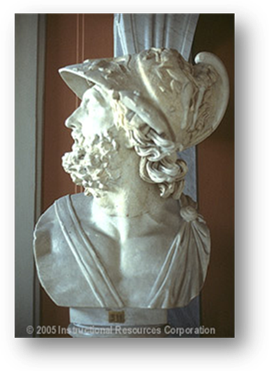
Menelaus
Paris
struck first but Menelaus caught the spear on his shield. He then swung at Paris and this caught Paris’
tunic. It did not wound him. Menelaus drew his sword which was now his
only weapon. When he drew this weapon,
it fell from his hands broken. He leaped
on Paris and grabbed his helmet’s crest.
This swung Paris off of his feet.
Menelaus would have dragged Paris back to the Greeks if Aphrodite had
not intervened. She tore the strap that
kept the helmet on Paris’ head and the helmet came away in Menelaus’ hand. Paris was picked up in a cloud and taken back
to Troy.
Furiously,
Menelaus went through the Trojan ranks looking for Paris. No one knew where he was or how he had
escaped the battle. So, Agamemnon spoke
to both armies. He said that Menelaus
had won and that the Trojans should give Helen back. This would have happened if Hera and Athena
had not intervened. Hera was determined
that the war would not end until Troy was completely destroyed. Athena swooped down to the battlefield. She convinced Pandarus, a Trojan, to shoot an
arrow at Menelaus. He was only slightly
wounded but the fact that someone would break the truce angered him and the
Greeks. The battle resumed.
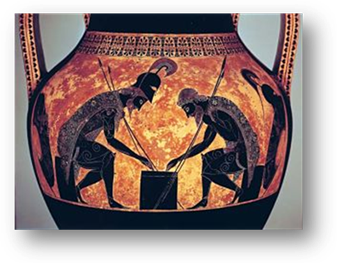
Ajax & Achilles
Two Heroes
Since
Achilles was in his tent, two heroes emerged on the Greek side. They were Ajax and Diomedes. They fought bravely. Aeneas came close to dying by Diomedes’
hands. He was more than just royal; he
was also the son of Aphrodite. When he
was wounded, she went to the battlefield to save him. She lifted him up in her arms. Diomedes, however, knew that she was
cowardly, and continued to approach her.
He wounded her hand. Crying, she
let Aeneas fall. She made her way back
to Olympus. Zeus made her stay away from
the battlefield and to remember that she should focus on love and not war. Aeneas was not killed. Apollo enveloped him in a cloud and carried
him to Pergamos, the holy place of Troy.
Here, Artemis healed him of his wounds.
Diomedes
continued fighting until he came face to face with Hector. There he also saw Ares, the god of war. Ares was fighting for Hector. At the sight of Ares, Diomedes called for the
Greeks to fall back slowly, and to keep their faces to the Trojans. This angered Hera. She asked Zeus to remove Ares from the
battlefield. Zeus gave her permission to
go to the battlefield. There, Hera stood
beside Diomedes and urged him to continue to fight without fear. At that point, Diomedes rushed Ares and
hurled his spear at him. Athena drove it
home, and it entered Ares’ body. The
War-god screamed and the awful sound frightened the Greeks and Trojans. Ares fled to Olympus and complained of
Athena’s violence toward him. Zeus told
Ares to quit his whining.
With
Ares gone, the Trojans were forced to fall back. A brother of Hector’s went to their mother
and told her to offer to Athena the most beautiful robe she owned and prayed
that she have mercy. Hector felt that
this was wise advice, but Athena denied this request.
Hector
returned to the palace briefly while his mother was making this offering to
Athena. He went to Andromache, his wife,
and Astyanax, his son. They both begged
him to remain with them inside the protective palace walls. Although Hector loved his wife and son, he
knew that he had to return to the battle.
He prayed that one day people would think of his son more highly than
they thought of him. He told them that
he loved them and returned to the battle outside of the palace walls.
By
the time Hector returned to the battlefield, Zeus had remembered the promise he
made the Thetis to avenge Achilles’ wrong.
He ordered all of the immortals to remain on Olympus. He went to earth to help the Trojans. Achilles sat alone in his tent and the battle
was not going well for the Greeks.
Hector drove his chariot through the Greek ranks. Many warriors fell beneath his spear. When the evening came, the Trojans had driven
the Greeks back, almost all the way to their ships.
A Turn of Events
Troy
rejoiced that night. The Greek camps
were filled with despair. Agamemnon was
ready to give up and sail back to Greece.
Nestor, the oldest and wisest among the chieftains, spoke out
boldly. He said that if Agamemnon had
not angered Achilles, the Greeks would not have been so easily defeated. He urged Agamemnon to find a way to appease
Achilles. Agamemnon confessed that he
had been a fool. He would send Briseis
back, along with other gifts. He begged
Odysseus to take his offer to Achilles.
Odysseus
and two other chieftains found Achilles with Patroclus, his best friend. Achilles welcomed them and provided food and
drink for them. When Odysseus and the
chieftains presented him with the gifts and Agamemnon’s offer, he refused. He said that he was sailing home and that all
the Greeks would be smart to do the same.
Odysseus
and the others returned to camp and told the Greeks of Achilles’ warning. They did not agree to sail back,
however. The next day, they were engaged
in a battle that did push them back to the beaches were their ships were
docked. Hera was planning on helping
them. She saw Zeus sitting on Mount Ida
watching the Trojans fight. She knew
that she had to go to Zeus looking so beautiful that he could not resist her. When he took her in his arms, she would pour
sweet sleep upon him and he would forget the Trojans. When Zeus saw her, her love overcame his
heart and he thought no more of his promise to Thetis.
At
once the battle turned to favor the Greeks.
Ajax hurled Hector to the ground. Before he could wound him, Aeneas
lifted him and bore him away. With
Hector gone, the Greeks were able to drive the Trojans far back from the
ships. If Zeus had not awakened, it is
possible that Troy would have been destroyed.
Zeus woke up and saw the Trojans retreating. It was clear to him that his sleeping was the
result of Hera and her trickery. Hera
promptly denied having anything to do with the Trojans’ defeat. She blamed Poseidon. Poseidon had been helping the Greeks. He ignored Zeus’ previous orders for all of
the immortals to stay out of the fight. Zeus sent Hera back to Olympus and summoned
Iris, the rainbow messenger, to command Poseidon to withdraw from the
battle.
Apollo
revived Hector and breathed into him surpassing power. Standing before the Greeks, Hector and Apollo
struck fear in all of the Greek warriors.
The Trojans again gained so much ground that they could set the Greek
ships on fire if they wished. The Greeks
were helpless and exhausted.
Patroclus
Patroclus,
Achilles’ best friend, saw what was happening to the Greeks. He could no longer deny fighting with
them. He asked Achilles for his
armor. Patroclus put on Achilles’ armor
and led the Myrmidons, Achilles’ men, to the battle. At first, the new group of men made the
Trojans waver. For a time, Patroclus
fought gloriously. Unfortunately, he met
Hector face to face. Hector’s spear gave
Patroclus a mortal wound. His soul fled
from his body and went into the Underworld.
Hector stripped Achilles’ armor from Patroclus’ body. Hector then took his own armor off and
dressed himself in Achilles’ armor. It
seemed as if Hector had taken on Achilles’ strength as well, and no Greek could
defeat him.
Evening
came and Achilles sat by his tent and waited for his friend, Patroclus, to
return. Instead, he saw Nestor’s son,
Antilochus, running toward him.
Antilochus was the bearer of bad news.
He told Achilles about what happened to Patroclus. Achilles became filled with grief for his
friend. His mother came to visit him,
attempting to cheer him up. Achilles
told Thetis that he could not live with himself if he did not attempt to get
revenge for the death of Patroclus.
Thetis reminded her son that he was fated to die after Hector. Achilles told his mother that if that was
meant to be, that was what would happen.
This time, Thetis did not attempt to hold him back. She told him to wait until the morning.
Achilles
That
morning, Thetis returned to Achilles’ tent.
With her, she brought weapons that were made by Hephaestus. Achilles’ put on the new armor and took up
the weapons. He went to the other Greeks
and announced that he intended to fight.
Everyone rejoiced. They prepared
for battle by eating a meal together.
When
everyone was finished eating, Achilles led the attack. The immortals knew that this would be a
historical battle and the last time that Hector and Achilles fought one
another. Zeus took out his scales and on
one side he set the lot of Hector’s death.
On the other, he put Achilles’ death.
Hector’s side sank down. It was
then known that Achilles’ would kill Hector in this battle.
Even
though the end of the battle was known to the immortals, the mortal men fought
long and hard on earth. The immortals
also took place in the battle. Zeus did
not object from this fighting. Athena
fought Ares, Hera fought Artemis, and Poseidon fought with Apollo.
By
the time the Scaean gates of Troy, the gates that led into the city, were
opened, the Trojans were completely retreating from battle. Only Hector remained immovable before the
city walls. From the gates, Hecuba and
Priam, his parents, called for him to come inside the walls and be safe. Hector did not obey the wishes of his
parents. He remained outside of the city
walls.
Achilles
appeared with Athena beside him. Hector
was alone. Apollo had decided to leave
Hector to his fate. As Achilles and
Athena approached Hector, he turned and ran.
Hector ran around the city walls three times with Achilles and Athena
chasing him. Athena made Hector stop
running. She appeared to him in the form
of Deiphobus, his brother. Hector now
thought that he had an ally to fight against Achilles. Hector told Achilles that if he killed him,
he would return his body to the Greeks.
He wanted Achilles to do the same, and return his body to the Trojans
and his family who was behind the city walls.
Achilles told him that there were no agreements made on the battlefield
between enemies, and he threw his spear at him.
It missed and Athena brought it back.
Hector threw his spear and it stuck in the middle of Achilles’
shield. This was of no use,
however. The armor was magical and could
not be pierced.
Hector
quickly turned to Deiphobus to take his spear.
Deiphobus was not there. Hector
then knew the truth; Athena had tricked him and there was no way he could
escape his fate. Hector decided that he
would go toward death fighting. He drew
his sword, which was now his only weapon.
He rushed upon Achilles. Achilles
had his spear, and before Hector could approach him, he drove the spear into
Hector near his throat. Hector was still
wearing Achilles’ old armor, and Achilles knew of a spot near the throat where
there was an opening large enough to be pierced with a spear. Hector fell, still pleading with Achilles to
give his dead body to his father.
Achilles again told Hector that he would not make agreements with
him. Hector’s soul fled to the
Underworld.
Achilles
stripped Hector’s body of his armor. He
then pierced the feet of the dead man and fastened them to the back of his
chariot, letting Hector’s head trail behind him. He then lashed, or whipped, his horses and
they began running around the walls of Troy, dragging the dead body of Hector.
On
Mt. Olympus, the gods were not pleased with the actions Achilles’ took with
Hector’s body. The abuse of the dead
upset everyone except Hera, Athena, and Poseidon. Zeus was very upset with this disrespect for
the dead. He sent Iris to Priam, to
order him to go without fear to Achilles and redeem the body of Hector, but to
take with him a rich ransom, or
money or items to be given in return for someone or something that was
taken. Iris was to tell Priam that even
though Achilles appeared to be violent, he was not really evil.
King
Priam then filled his chariot with the best items Troy had to offer. He went to the Greek camp looking for
Achilles. Hermes met him, looking like a
Greek youth, and offered himself to guide Priam to Achilles’ tent. Priam approached Achilles, the man who had
killed his son and so violently disrespected his body. Priam fell to his knees and took Achilles
hands in his. When he did this, Achilles
and all of the other Greeks were in awe of King Priam. He told Achilles to think of his own father
and of his desire for a son. Priam
reminded Achilles that he was old and that he felt deep sorrow at the death of
Hector. Achilles told Priam to sit with
him.
Achilles
was filled with grief when he listened to Priam speak. Achilles told his servants to wash and anoint
Hector’s body with oil and cover it with a soft robe. He did not want Priam to see his son’s body
in its mangled state. Achilles told
Priam that he would keep the Greeks back from battle for as long as Priam
wanted to make Hector’s funeral pyre.
Priam brought Hector home.
Everyone in Troy, including Helen, the reason for this great war, wept
for Hector.
The
city of Troy mourned for nine days.
Then, they laid his body on a funeral pyre and set fire to it. When it had burned, they stopped the fire
with wine and gathered the bones into a golden urn. They set the urn in a hollow grave and piled
stones over it. This was the funeral for
Hector. Homer’s Iliad ends with Hector’s funeral.
But
the war was not over.
|
|
Now
answer questions 1 through 28. |
Argue the Case

Who
was responsible for starting the Trojan War?
According to Homer, the judgment of Paris was the beginning of the
Trojan War. It could be argued that
Eris, Aphrodite, and Helen were also to blame for the beginning of the war as
well. Who do you believe was most
responsible for the beginning of the Trojan War?
Your
task is to become the prosecuting attorney in a case against one of the people
or gods blamed for starting the Trojan War.
The defendant has been on trial, and it is now time for the closing
arguments to be presented. Your job is
to convince the judge and jury that the defendant is guilty.
In
order to be convincing, you need to present the facts in an orderly
manner. Begin by choosing the person or
god whom you believe is guilty. Then list
the reasons why you believe the person or god is guilty. Do this on the PDF form
provided. Open the form, enter your
information, and save your final copy on your computer. You will be asked to submit this form in the
questions section of this unit.
Next,
use your evidence form to write your closing arguments. Keep in mind that the arguments need to be
brief yet convincing. Your job is to use
your words to sway the hearts and minds of the judge and jury and receive a
guilty verdict. Use descriptive
words. Be persuasive. Present the facts.
After
you have written your closing arguments, re-read them. Are they completely convincing? Could you add more persuasive words to make
the argument even stronger? Could you
appeal more to the emotions of the judge and jury? Revise your closing arguments to make them
even stronger. Then submit the revised
version in the questions section of this unit.
After
you have revised the content of your arguments, proofread the document for
errors. Correct all spelling,
punctuation, capitalization, and verb tense errors. Check for sentence fragments and run-on
sentences. Correct all errors. Verify that your closing arguments meet the
criteria listed in the checklist below.
|
Closing Arguments Evaluation Questions |
||
|
YES |
NO |
|
|
|
|
Did the closing
arguments include at least four pieces of evidence pointing to the defendant
being guilty of starting the Trojan War? |
|
|
|
Did the closing
arguments include adequate persuasive language? |
|
|
|
Did the closing arguments
include adequate descriptive words? |
|
|
|
Did the closing
arguments appeal to the emotions of the judge and jury? |
|
|
|
Were the closing
arguments free of spelling errors? |
|
|
|
Were the closing
arguments free of capitalization errors? |
|
|
|
Were the closing
arguments free of punctuation errors? |
|
|
|
Were the closing
arguments free of run-on sentences? |
|
|
|
Were the closing
arguments free of sentence fragments? |
|
|
|
Were the closing
arguments convincing? |
When
you are satisfied that you can answer YES to each question on the evaluation
list, submit the final draft of your arguments in the questions section of this
unit.
After
you complete the final draft of the closing arguments, record yourself
delivering them to the judge and jury.
Use a strong, commanding voice.
As you speak, vary your speed and volume. Sound like the authority on this topic, and
present your facts. You will record
yourself delivering the closing arguments in the questions section of this
unit.
|
|
Now
answer questions 29 through 33. |

